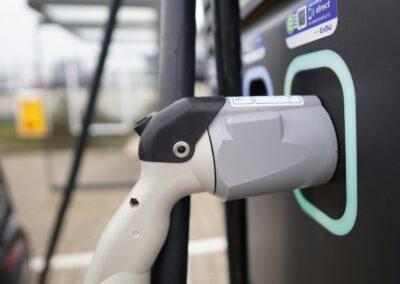Transforming Energy Distribution with Digital Twins in Smart Grids
Introduction to Digital Twins in Smart Grids
The integration of digital twins in smart grids is a groundbreaking development that promises to revolutionize energy distribution. In regions like Saudi Arabia and the UAE, where the drive for technological advancement is strong, this innovation holds significant promise. Digital twins—virtual replicas of physical systems—offer unprecedented insights and control over energy distribution networks. By simulating and analyzing real-time data, they enhance the efficiency and reliability of energy distribution, making them a critical asset for modern energy management.
Saudi Arabia and the UAE are at the forefront of adopting cutting-edge technologies to achieve their ambitious goals for sustainable development. The application of digital twins in smart grids aligns with these nations’ visions to enhance energy efficiency and ensure reliable power supply. This synergy between advanced technology and strategic national goals underscores the importance of digital twins in transforming the energy sector.
Furthermore, the use of digital twins in smart grids is not just about improving energy distribution; it is also about enhancing overall grid management. These virtual models provide detailed insights into the performance of various grid components, enabling proactive maintenance and reducing downtime. As a result, the energy distribution network becomes more robust and capable of meeting the increasing demand for electricity in these rapidly developing regions.
The Role of Digital Twins in Enhancing Energy Efficiency
The implementation of digital twins in smart grids significantly boosts energy efficiency. By creating a digital replica of the entire grid, operators can monitor and manage energy flow with unparalleled precision. In Saudi Arabia and the UAE, where energy consumption is substantial, optimizing energy distribution is crucial. Digital twins enable real-time monitoring and predictive analytics, allowing for immediate adjustments to prevent energy loss and ensure optimal performance.
One of the key benefits of digital twins is their ability to predict potential issues before they occur. By analyzing data from various sensors and devices within the grid, these virtual models can identify patterns and anomalies that may indicate future problems. This proactive approach to energy management helps to minimize disruptions and ensures a steady supply of electricity to consumers. In the context of business operations, this reliability is vital for maintaining productivity and achieving business success.
Moreover, digital twins facilitate the integration of renewable energy sources into the grid. By accurately modeling the behavior of solar panels, wind turbines, and other renewable assets, operators can optimize their performance and ensure a balanced energy mix. This capability is particularly valuable in regions like Saudi Arabia and the UAE, where there is a strong emphasis on developing sustainable energy solutions. The seamless integration of renewable energy not only enhances efficiency but also supports the broader goals of environmental sustainability.
Business Success through Advanced Technology
In the competitive business landscape of Saudi Arabia and the UAE, leveraging advanced technologies like digital twins can provide a significant advantage. Companies that adopt these innovations can enhance their operational efficiency, reduce costs, and improve service delivery. For business executives and mid-level managers, understanding the potential of digital twins in smart grids is essential for making informed strategic decisions that drive success.
Executive coaching services play a crucial role in helping leaders navigate the complexities of implementing new technologies. By offering tailored guidance and support, executive coaches enable leaders to harness the full potential of digital twins and other advanced technologies. This support is invaluable in ensuring that the transition to smart grid systems is smooth and that the benefits of improved energy efficiency are fully realized.
Furthermore, the integration of digital twins with other emerging technologies, such as artificial intelligence and blockchain, opens up new possibilities for innovation. For instance, AI algorithms can enhance the predictive capabilities of digital twins, while blockchain technology can provide secure and transparent data management. These synergies create a robust framework for optimizing energy distribution and achieving business success in a rapidly evolving technological landscape.
Leadership and Management Skills for the Future
As the energy sector continues to evolve, the demand for skilled leaders who can navigate these changes is growing. Effective leadership and management skills are critical for successfully implementing digital twins in smart grids and other advanced technologies. In Saudi Arabia and the UAE, where ambitious projects and rapid development are the norms, leaders must be equipped with the knowledge and expertise to drive innovation and achieve strategic goals.
Executive coaching services can help leaders develop the necessary skills to manage the complexities of modern technology. By focusing on areas such as strategic planning, decision-making, and change management, executive coaches prepare leaders to tackle the challenges and seize the opportunities presented by digital twins and smart grids. This investment in leadership development is essential for ensuring that businesses remain competitive and successful in the face of technological advancements.
Moreover, fostering a culture of continuous learning and innovation is crucial for sustaining business success. Leaders must encourage their teams to embrace new technologies and explore innovative solutions. By promoting a mindset of adaptability and resilience, businesses can thrive in a dynamic environment and leverage the full potential of digital twins in smart grids to enhance energy distribution efficiency and reliability.
Conclusion: Embracing the Future with Digital Twins
In conclusion, the integration of digital twins into smart grids represents a significant advancement in energy distribution technology. By enhancing efficiency and reliability, digital twins offer substantial benefits to regions like Saudi Arabia and the UAE, where technological innovation and sustainable development are top priorities. For business executives, mid-level managers, and entrepreneurs, understanding and leveraging these technologies is key to achieving business success and staying ahead in a competitive market.
With the support of executive coaching services and a commitment to leadership development, businesses can effectively navigate the complexities of implementing digital twins and other advanced technologies. This proactive approach ensures that companies are well-positioned to capitalize on the opportunities presented by the evolving energy sector and continue to thrive in a rapidly changing world.
Ultimately, embracing the future with digital twins in smart grids is not just about improving energy distribution; it is about driving innovation, enhancing business success, and contributing to the sustainable development goals of Saudi Arabia and the UAE. By staying at the forefront of technological advancements, businesses can achieve long-term success and make a positive impact on the world.
#DigitalTwins #SmartGrids #EnergyEfficiency #TechnologyInSaudiArabia #TechnologyInUAE #BusinessSuccess #ArtificialIntelligence #Blockchain #Metaverse #ExecutiveCoaching























